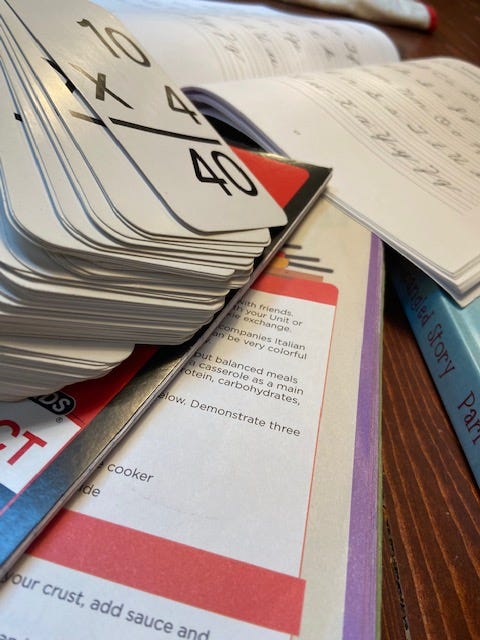The idea of “slow schooling” is not new, but it sometimes gets confused with other ideas such as “unschooling”. Unschooling is defined as “allowing children as much freedom to learn in the world, as their parents can comfortably bear.” (1) John Holt and his followers are careful to explain that this is not “un-parenting”, but say that their children (and by definition, students) learn only what and when it makes sense for them to do so. This is different from what I term “slow schooling”, especially from a Christian perspective.
The scriptures are clear that parents are responsible for their child’s upbringing, and that includes not only their care and protection, but their education as well. I realize that Deuteronomy 6:5-9 has been the clarion call to bring (or beat) Christian parents into submission regarding teaching their children at home, but it’s hard to grasp that one verse and run with it like you’ve got the football and a set of fire jets on your sneakers. Yes, we--and fathers, especially--are expected to raise and nurture their children in the admonition of the Lord, but with regards to by who and by what means your child may learn algebra...that seems to be an issue that can only be settled within each individual family. Slow schooling, therefore, is not the only ordained biblical method of educating your children. Practically speaking, however, a child spending the enormity of their day under the tutelage of other people in alternative systems will not easily abandon the implicit worldviews they are taught five or more days a week. One hour of Sunday school at the local church, and even the short time in the evenings as family time, is no match for the weekly average of 32 hours in their seats at the government school, and to insist otherwise is rather disingenuous.
Because parents are ultimately responsible for their child’s education, whether at home or otherwise, parents do bare the burden of choosing and selecting opportunities for learning. That is to say, yes, the child may have an innate interest in botanical flowers, but if the child is never exposed to the wonders of chemistry, that child may never reach the potentially satisfying work of pharmacognosy or phytotherapy. Or even know what those words are without an introduction to Latin. Parents, with their experience and wisdom, can and should provide at least a clear direction for their children to embark upon, even as they take into account individual and unique interests and proclivities.
Slow schooling is not full-time child management. It is not scheduling the child for every hour of the day or week. It is not marching the child from one subject to another to chore time to lunch time to nap time to story time ad nauseum. Yes, it allows routine in the day for meals and so forth, but it also allows plenty of time for boredom and personal interests and projects. It also does not necessarily demand the completion of activities or even curriculum for which the child shows no interest or inclination. Many subjects are simply imposed simply because the child is a certain age (or “grade” level) and have no bearing on whether or not the child is ready to undertake the study.
Slow schooling is also not “school at home”. Unless this is a customary practice in home life, we don’t begin our days with the Pledge of Allegiance (do they still do that in government schools?) or sit in rows. Rather, education is entwined into the fiber and fabric of our days, not as an addendum or necessarily separate. Just as a mother may sit on the sofa knitting up a sweater, a child may be taking apart the latest computer gadget at the dining room table. It is not considered “home economics time” for mother any more than “electronics period” for the child. Routines may again be in play; we might generally read aloud during a certain portion of the day for example. But flexibility allows for steeping tea for the neighbor at the door should that occur. Math work one day may entail a full and engrossed 90 minutes and not be seen again for days. The routine, more loosely defined than a schedule, is our helper and never our master.
Although children who are homeschooled are generally well-mannered and excel in socialization across all people ages and groups, the goal of slow schooling is not to “raise good kids.” Instead, we endeavor to raise children to live with a full understanding, and hopefully a sincere and precious faith, that works itself out by the Holy Spirit in growing them in character, deeds, and charity. Behavior modification is never the goal or the means by which to achieve that. In all things, from making the bed to showing kindness to a sibling to putting forth an honest effort and willingness into whatever is attempted, there is a view of the cross and a treasured gratitude for the love that God has in His mercy lavished upon them. Humility, and not self-esteem, is the real prize.
Lastly, slow schooling is not in an effort to impress the outside world with our virtuo violinists or early college entrances or impressive standardized test scores. It is, rather, an obedient call to the Lord who tenderly draws the conscience and heart to a more present, quiet, simple, and deliberate lifestyle. It may not be the answer or road for everyone, but for me and my house, the pilgrimage has been pleasant.
Aug 31 2016 http://www.holtgws.com/whatisunschoolin.html




